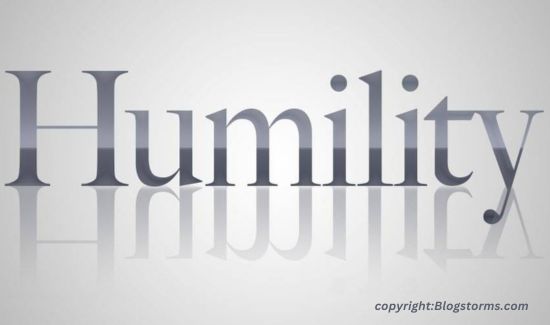Humility is a quality often overlooked in today’s fast-paced and competitive world. In a society that often celebrates self-promotion and assertiveness, humility may seem like a weakness rather than a strength. However, the truth is quite the opposite. Humility holds immense power and can significantly impact both personal and professional success.
Table of Contents
Introduction to Humility
At its core, humility is about having a modest view of oneself and showing respect for others. It means understanding what you’re not good at and being ready to learn from people around you. In a world where arrogance and self-centeredness often prevail, humility stands out as a rare and valuable trait.
The Pitfalls of Arrogance
Arrogance, on the other hand, can be detrimental to both individuals and society as a whole. When someone is overly confident and dismissive of others, it creates a toxic environment that stifles collaboration and growth. History is replete with examples of arrogant leaders and individuals whose hubris led to their downfall.
The Virtue of Humility

In contrast, humility fosters genuine connections and promotes a culture of mutual respect. It allows individuals to admit their mistakes and learn from them, leading to personal and professional growth. Humble individuals are often more approachable and empathetic, making them effective leaders and team players.
Humility in Leadership
Leaders who possess humility are more likely to inspire trust and loyalty among their team members. They are willing to listen to diverse perspectives and empower others to succeed. By leading with humility, they create a positive work environment where collaboration thrives and innovation flourishes.
Cultural Perspectives on Humility
Cultural attitudes towards humility vary widely, but many societies value modesty and humility as virtues. In Eastern cultures, humility is often seen as a sign of wisdom and maturity, whereas in Western cultures, it may be viewed as a sign of weakness. However, regardless of cultural differences, humility is universally recognized as a key component of moral character.
Recognizing the Crabby Attitude
The phrase “거만한 크랭키/작다고 무시하면 안 돼요” encapsulates the essence of arrogance. It warns against disregarding the significance of small yet arrogant behaviors. By labeling them as “small,” we risk minimizing their impact and allowing them to persist unchecked.
Overcoming Ego
Cultivating humility requires self-awareness and a willingness to confront one’s ego. It means not always needing to be correct and being okay with showing vulnerability. By recognizing that no one has all the answers, individuals can foster humility and foster meaningful connections with others.
Humility and Success

Contrary to popular belief, humility is not a barrier to success; it is a catalyst for it. Humble individuals are more likely to seek feedback and continuously strive for improvement. They are also better equipped to handle setbacks and challenges with grace and resilience.
Humility in Relationships
In personal relationships, humility plays a crucial role in fostering empathy and understanding. By putting aside ego and prioritizing the needs of others, individuals can build stronger and more fulfilling connections with their loved ones.
Challenges in Practicing Humility
Despite its many benefits, embracing humility can be challenging, especially in a society that often rewards self-promotion and assertiveness. Overcoming societal pressures and ingrained habits requires conscious effort and a commitment to personal growth.
Humility vs. Self-Deprecation
It’s important to distinguish between humility and self-deprecation. While humility involves recognizing one’s strengths and weaknesses without arrogance, self-deprecation involves diminishing one’s self-worth. True humility involves acknowledging one’s worth while remaining open to feedback and growth.
Humility as a Continuous Journey
Humility is not a destination but a journey. It requires ongoing reflection and self-improvement. By adopting a growth mindset and embracing humility as a lifelong practice, individuals can continue to evolve and thrive in all areas of their lives.
Humility in the Digital Age

In an era dominated by social media and digital communication, maintaining humility can be challenging. The pressure to present a curated image of oneself online often leads to egocentric behavior and superficial interactions. However, by staying grounded in humility, individuals can navigate the digital landscape with authenticity and integrity.
The Influence of Humility in Conflict Resolution
Humility is also instrumental in resolving conflicts peacefully. By approaching disagreements with humility and empathy, individuals can defuse tension and find mutually beneficial solutions. Humble communication fosters understanding and reconciliation, paving the way for stronger relationships.
Celebrating Humble Achievements
Finally, it’s essential to celebrate achievements with humility. Rather than seeking validation or recognition, humble individuals focus on the impact of their actions and the contributions of others. By sharing success stories with humility, they inspire others to strive for greatness while remaining grounded in gratitude.
FAQs about 거만한 크랭키/작다고 무시하면 안 돼요
Q: Is humility a sign of weakness?
Ans: No, humility is not a sign of weakness but rather a strength. It takes courage and self-awareness to acknowledge one’s limitations and embrace vulnerability.
Q: Can humility be learned?
Ans: Yes, humility can be cultivated through self-reflection, empathy, and a willingness to learn from others. It is a lifelong journey of personal growth and development.
Q: Does humility mean putting oneself down?
Ans: No, humility is not about putting oneself down or diminishing one’s self-worth. It is about recognizing one’s strengths and weaknesses with honesty and humility.
Q: How does humility contribute to leadership effectiveness?
Ans: Humble leaders inspire trust and loyalty among their team members by listening to their input and valuing their contributions. They create a positive work environment where collaboration thrives.
Q: Is it possible to be too humble?
Ans: While humility is a virtue, it is essential to strike a balance and avoid self-effacement. Being overly humble can sometimes undermine one’s confidence and effectiveness.
Conclusion
In conclusion, humility is a powerful virtue that holds the key to personal and professional success. By embracing humility, individuals can foster meaningful connections, inspire trust and respect, and navigate life’s challenges with grace and resilience. As we strive to become the best versions of ourselves, let us remember the profound impact of humility on our lives and the world around us.
